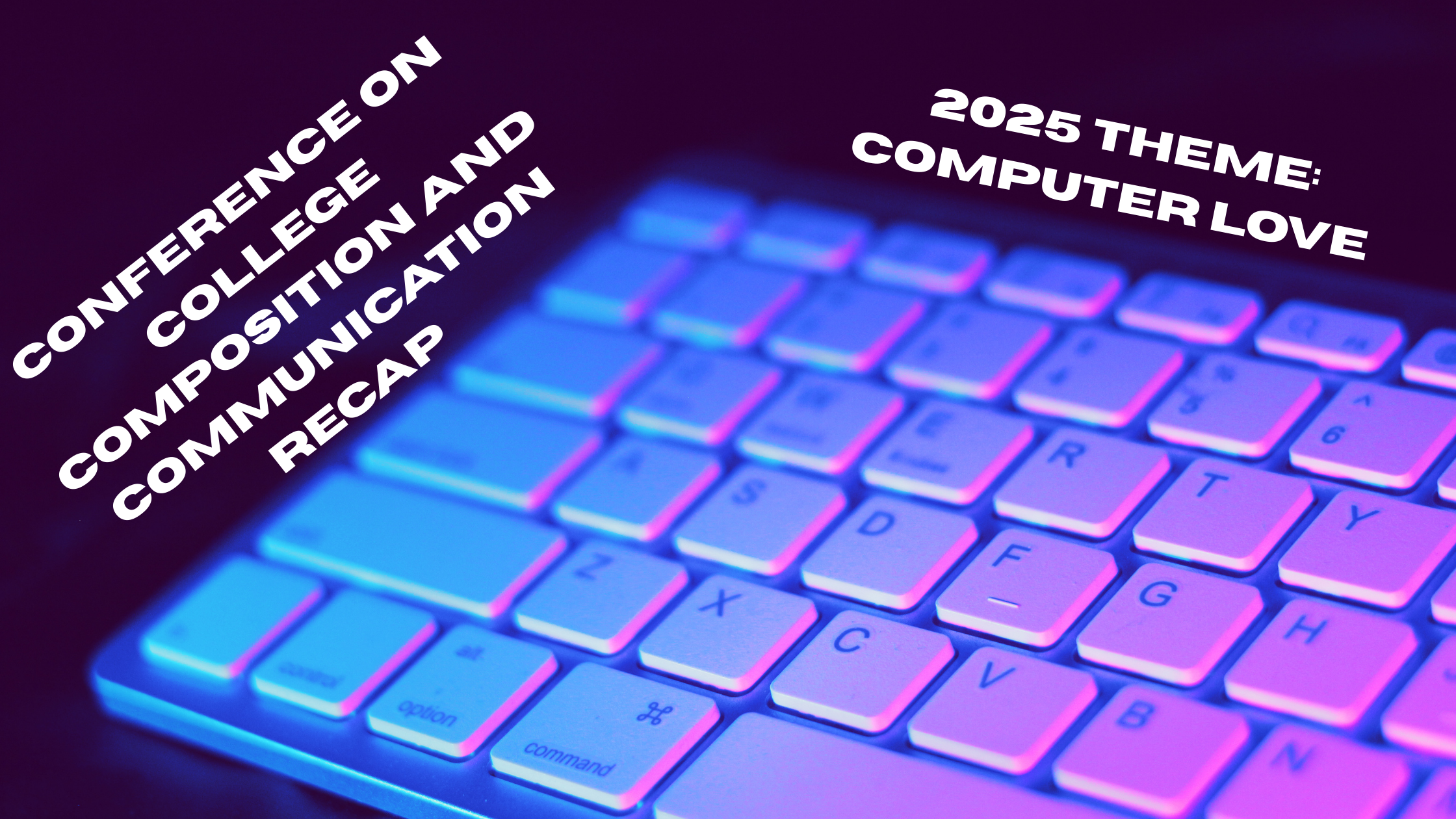The Conference on College Composition and Communication (Cs) is a gateway to public discussion that advocates for the ever-evolving definitions of “literacy, communication, rhetoric, and writing (including multimodal discourse, digital communication, and diverse language practices).” Through collaboration and the promotion of ethical scholarship, Cs empowers diverse individuals and communities that will hopefully translate to practical solutions and modeling in teaching and learning. The annual convention was held last month in Baltimore with the theme: “Computer Love”: Extended Play, B-Sides, Remix, Collaboration, and Creativity. DePaul’s WRD program was represented by an alumna, a student, and four faculty members: Madeline Crozier, Reina Nomura, Dr. Maria Prikhodko, Dr. Lydia Saravia, Professor Marta Scherbakova, and Dr. Erin Workman.
Nomura, Dr. Workman and Dr. Prikhodko each offered insight into their research, presentation materials, and overall experience at Cs.
This was Nomura’s first experience at Cs and she found it to be a “friendly space and generative in terms of ideas.” The prioritization of practical and intentional pedagogy made Cs a perfect place for her research and presentation, which was titled Remixing “Think-Pair-Share” with Notecards, Google Drive and PollEverywhere. Keeping with the theme of impactful pedagogy across context and space, multimodal technologies were incorporated to enhance learning and reflective practices in the classroom. Nomura gave practical approaches to remixing Think-Pair-Share, including usingindex cards for “mini free-writes” that prompt individual reflection, randomizing small groups to collaborate on a document in Google Drive to exchange ideas, and polling anonymously on PollEverywhere to debrief the lesson as a whole class. Nomura noted that the collaboration went beyond just sharing a presentation. The chairs of Teacher 2 Teacher (T2T), a pedagogical roundtable for writing instructors, had a Google Drive to focus on creating community and sharing all presentation material and leaning on each other to share materials.
In contrast to Nomura’s first time attending the conference, Dr. Workman is a seasoned pro—with the 2025 Cs being her 11th one! She continues to be inspired by the important work being done by her peers. “What resonated most with me was a panel on Keeping Crip Company: Stories of Disabled Intimacies and In/accessibility, which brought together five speakers to discuss questions of care ethics, il/legibility of access moves, relational practices to enable “access intimacy,” institutional barriers to accessibility, and the role of story in these processes and practices.” Similar to the work that was inspiring her, Dr. Workman was equally inspiring through three speaking engagements. In addition to chairing and presenting at two panels, she gave her own presentation: Queering Writing Constructs: Remixing Conceptions of Writing, Diversifying Literacies. Drawing from her dissertation and previous focus on the transfer of writing knowledge and practice in FYW, Dr. Workman was able to find the connection between her previous scholarship and apply that to her research at Cs. In this research she “provided some institutional context for First-Year Writing (FYW) at DePaul, drew from [her] earlier qualitative study of students’ conceptions of writing and writing practices, and took up Sheila Carter-Tod’s call for pluralizing rhetorics FYW, an approach that “sees culture as intertwined and fully infused in all aspects of textual creation and analysis.”
Dr. Prikhodko is also no stranger to Cs. This year, she focused her research on institutional constraints and writing activities done in the classroom. Her panel, specifically, dealt with these topics within the context of Ukraine. “We were [dissecting] how the war in Ukraine is being discussed. We tried to approach it from a composition or rhetorical perspective. Originally my research was on international student literacies in multilingual writing classes. I was researching indigenous, rhetorical practices but that shifted to a focus on more marginalized practices that are specific to the war in Ukraine.” Dr. Prikhodko’s Ukrainian heritage informs her passion for the topic and in turn creates an important discussion space. She credits Cs for creating such a space that she sometimes finds to be lacking within the academic community. “I cannot help but do it…. I had never found a good place to talk about myself as a multilingual professor of writing in my own traditional constraints. I needed more space to do that.” Through her perspective on war, Dr. Prikhodko wishes to expand on this research by posing questions such as: How can I teach English or writing so people stop killing each other? How can I bring more empathy into teaching writing? How can we as teachers be okay with uncertainty in the classroom?
Cs created these spaces the Dr. Prikhodko is speaking of—spaces where scholars can collaborate and enter into discussions that will promote active and positive change within academic communities and beyond. In hearing of these three unique experiences, Cs clearly values diverse perspectives and scholarship while balancing an understanding that work needs to be done and rhetorical listening is necessary.
Visit Cs website to learn more about the work done at Cs 2025 and how to get involved for Cs 2026!
